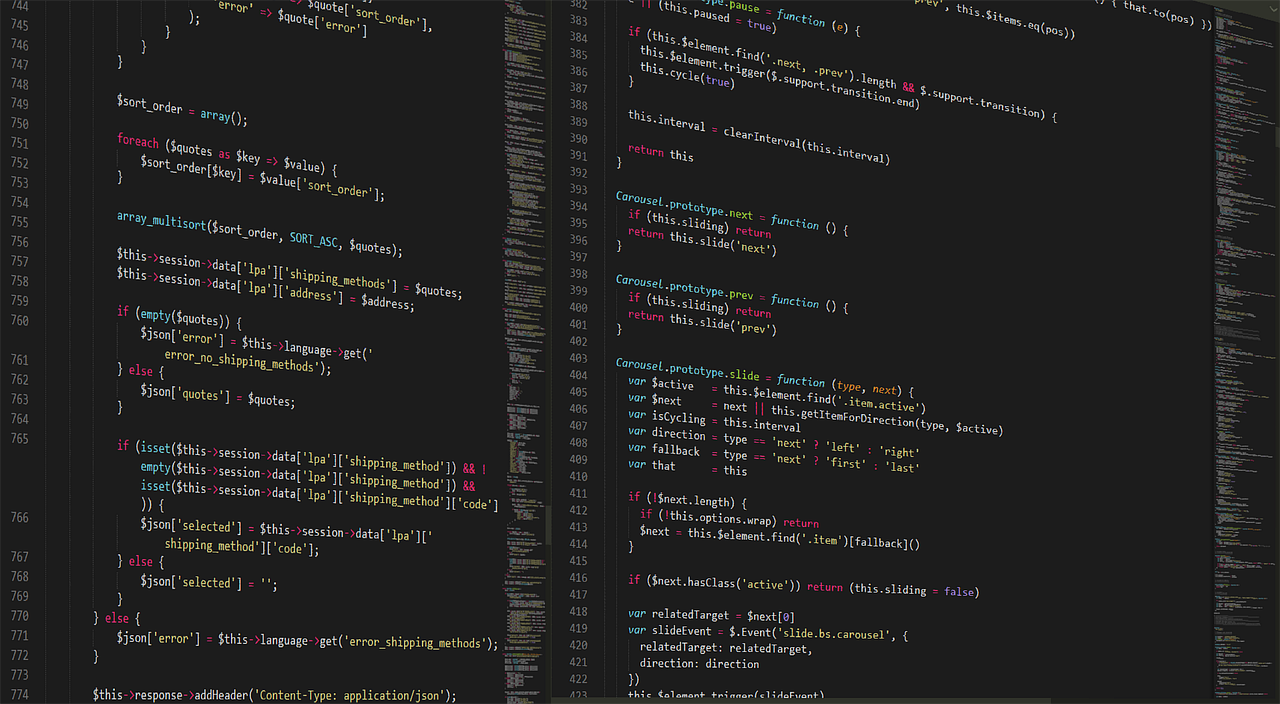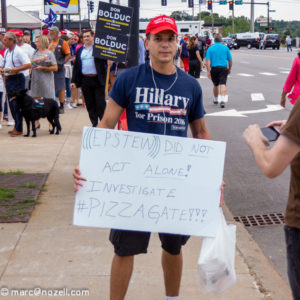
QAnon as a Religion
Annabelle Bichler
Photo from Pixabay
On October 28, 2017, a post appeared on 4chan, an anonymous online message board, alleging Hillary Clinton’s imminent arrest and a subsequent violent national uprising. The poster, whose username was simply the letter “Q,” claimed to be a high-ranking government intelligence officer with access to classified information. Hillary Clinton was not arrested and no subsequent insurrection ensued. Q, however, remained undeterred. Since October 2017, there have been continuous “Q-drops” that consist of cryptic warnings regarding international politics, grievous allegations directed toward the “deep state” liberal government bureaucracy, and fervent praise of President Donald Trump. Since the initial post, Q’s dominion has evolved to encompass a conglomeration of competing hate groups, and is now composed of white supremacists, “incels,” and members of the alt-right, among others.
QAnon, as this conspiracy system has been dubbed, has ridden the line of religiosity from its inception. Emulating the Blood Libel of the Middle Ages, an antisemitic canard which falsely accused Jews of murdering Christian children in order to use their blood as part of religious rituals, as well as the “Satanic Panic” of the 1980s, QAnon doctrine posits that a cabal of Democrats and celebrities engage in ritual kidnapping, sexual abuse, and cannibalization of innocent children while Donald Trump acts as the sanctified savior, battling this unholy evil behind the scenes. Q’s posts frequently quote the Christian Bible alongside allegations of government criminality and apocalyptic predictions, citing an ongoing battle between good and evil — exemplified by the political battle between Conservatives and Liberals — as conjunctive to the Biblical battle between God and Satan.
Though the FBI has labeled QAnon a potential domestic terrorist threat, for many devout Christians, “QAnon has become a hermeneutical lens through which to interpret the world.” As a result of general mistrust in mainstream media outlets and QAnon’s use of explicitly spiritual Christian language, QAnon beliefs have begun to gain traction in white Evangelical churches throughout the United States. Further, such promulgation of QAnon conspiracy in Evangelical communities has prompted the creation of “QAnon churches,” congregations “where QAnon conspiracy theories are reinterpreted through the Bible,” and “[i]n turn, QAnon conspiracy theories serve as a lens to interpret the Bible itself.”
The COVID-19 pandemic has prompted many meetings — both secular and religious — to transition to digital platforms, such as Zoom, to allow for mass communication. Many established churches have taken advantage of this, holding services online. However, this new norm pertaining to virtual worship gatherings has allowed QAnon to take full advantage of an existing model of neo-charismatic home churches. One such church, Omega Kingdom Ministry (OKM), is part of a broad network of independent QAnon-related congregations (or ekklesia) called Home Congregations Worldwide (HCW).
The resource page of the HCW website contains an interactive map showing email addresses for home congregation leaders in 43 U.S. states, the United Kingdom, Germany, New Zealand, and Australia. The worship resources consist solely of links to QAnon propaganda. The website also mentions the Seven Mountains of Societal Influence, a Christian belief system reminiscent of Dominionism in its desire for nations to be governed by Christian biblical law. This ideology seeks to transform the world through the seven mountains of society — religion, family, education, government, media, entertainment, and business — blending QAnon’s apocalyptic desire to destroy a society “controlled” by the deep state and its anticipation for the Kingdom of God on Earth.
For many devout Christians, QAnon has become a hermeneutical lens through which to interpret the world.
HCW is not the only QAnon congregation, however. One of the most popular online QAnon evangelists is a former emergency medical technician from Arizona named David Hayes. Hayes, who runs the QAnon evangelical ministry Praying Medic, has over 430,000 followers on Twitter. Prior to being blocked by Youtube, Hayes’ video titled “Q for Beginners Part 1” had been viewed over 1 million times, with his entire channel garnering over 33 million views. To date, he has written fourteen books — all of which are selling on Amazon — varying from how-to guides on performing miracles and convening with angels to a series called “Q Chronicles” that unpacks QAnon doctrine. Hayes claims that God spoke to him in a dream and led him to QAnon, compelling him and his wife to both quit their jobs in order to focus on QAnon evangelism full-time. Hayes registered Praying Medic as a Christian religious nonprofit in Washington State in 2018, though it does not appear that the organization is recognized by the IRS.
The Supreme Court has never adopted a constitutional definition of religion. Increasing religious pluralism, considered to be a cornerstone of American society, has heavily impacted the Court’s varying, and often conflicting, interpretations of the First Amendment’s Religion Clauses — interpretations that alternate between narrow and broad, resulting in a dilemma of definition. A narrow, conventional definition of religion, encompassing traditional theistic beliefs and practices, would allow for more constitutional clarity but would not necessarily encompass the broad freedom of belief which the Religion Clauses are generally understood to protect. A broad definition, on the other hand, might better reflect the evolving values and belief systems of the contemporary American polity, but would perhaps accord First Amendment protections too indiscriminately.
The Supreme Court has largely evaded such definitional decision-making, relying instead on the doctrinal test of nondiscrimination and emphasizing formal equality, while leaving the question of how to define religion unresolved. A sociological perspective may help inform such a definitional discussion, however. In his research at the Global Network on Extremism & Technology, Marc-Andre Argentino suggests that “we view QAnon as a ‘hyper-real religion.’ Sociologist Adam Possamai, who coined the term, defines it as ‘a simulacrum of a religion created out of, or in symbiosis with, commodified popular culture which provides inspiration at a metaphorical level and/or is a source of beliefs for everyday life.’” Argentino explains further:
What this means is that technology and the marketplace of ideas have inverted the traditional relationship between the purveyors of religion and the consumers of religion. Thus, we see religious doctrinal authority (that is, those who can contribute to the religion’s teaching) being created by popular culture.
Argentino points out that scholars of religion do not attempt to validate or discredit religions, because such empirical analysis is irrelevant to the study of religious practitioners. Routinized behavior, pertaining to what adherents regard as sacred, results in the construction of a religion. All religions, including hyper-real ones, are socially constructed and developed over time. QAnon combines popular culture, media, entertainment, American evangelicalism, and conspiracy theories to create a belief system that has evolved to possess common traits of religion.
The issue, however, with QAnon is that it piggybacks on existing Evangelical Christianity, utilizing a monotheistic structure and regarding the Bible as a central text. Assuming, arguendo, that a broad definition of religion is adopted, QAnon adherents might expect and demand First Amendment protections. But, and perhaps more concerning, even a more narrow definition of religion could implicate heightened constitutional protections if QAnon is seen as closely associated with Evangelical Christianity.
In his book The Pursuit of the Millennium, Norman Cohn demonstrates that the historic emergence of apocalyptic thinking consistently took place alongside rapid social and economic change and during periods of disparate economic inequality. The Seventh-day Adventists, founded in the midst of the Civil War, and the Church of Jesus Christ of the Latter-day Saints, founded in conjunction with the second Great Awakening, are two of the more recently developed indigenous American religions recognized by the United States Government. Both religions were founded during periods of social unrest in the United States. Even more recently, the Church of Scientology, founded in the mid-1900s, received years of backlash before being recognized as a religion by the IRS in 1993. QAnon appears to be following the established trend in terms of religious development in the United States. Contemporary America currently exhibits clear social and economic unrest, with the United States demonstrating the highest level of income inequality among G7 nations, the increasingly contentious dichotomy between American liberals and conservatives, the Black Lives Matter movement, and the COVID-19 pandemic — creating an environment of isolation and tumult where the QAnon belief system has thrived.
Under current First Amendment jurisprudence, “hate speech can only be criminalized when it directly incites imminent criminal activity or consists of specific threats of violence targeted against a person or group.” There is no legal definition of “hate speech” recognized under United States law, though generally, it refers to any form of expression through which a speaker intends to vilify, humiliate, or incite hatred against a group or a class of persons on the basis of race, religion, skin color, sexual identity, gender identity, ethnicity, disability, or national origin. In Packingham v. North Carolina, Justice Anthony Kennedy said “cyberspace, and social media in particular, was among the ‘most important places… for the exchange of views,’” and compared the internet to a public forum “akin to a public street or park.” However, the discourse surrounding the regulation of speech on the internet is contentious and “raises serious concerns about the future of free speech, including attempts at censorship by government actors critical of comments on social media, the shifting standards of private platforms to censor online expression and the rise of hate and extremist speech in the digital world.”
What happens when religion, hateful rhetoric, and misinformation all combine?
In January of 2018, Clemson University researcher Darren Linvill “found frequent references on [Twitter] posts with QAnon hashtags to ‘shooting,’ ‘hanging’ and ‘firing squad.’ Some have been removed among recent enforcement by the company.” Social media platforms Reddit, Youtube, Facebook, Instagram, Patreon, and Twitter have all banned QAnon-related content. This regulation, however, represents a recent development, with many critics believing that a vast amount of damage has already been done in terms of spreading violent rhetoric and misinformation about politicians, celebrities, current events, vaccines, and the COVID-19 pandemic.
There is no uniformity to the censorship of hate speech on social media, nor is there any direction from the courts. Should cyberspace be viewed as a public forum, the question now becomes whether the free speech protections of the First Amendment may, or even should, be applied to the censorial actions of private social media platforms and whether social media platforms should be solely responsible for establishing guidelines for censoring hate speech. St. John’s University law professor Kate Klonick states that “while the court recently found in dicta that social media spaces were akin to the ‘public square,’ and access to them could not be blocked by the state, that’s still a far cry from saying Facebook or Twitter or Google are stepping fully into the role of the state and thus should be held to a First Amendment standard.”
Given the thorny legal issues at play, the online speech at issue here continues to be a source of contentious debate, while also having real-world consequences. Violent incidents relating to QAnon date back to December of 2016, when a North Carolina man armed with three loaded guns drove 360 miles to a pizzeria in Washington, D.C., intending to free the children allegedly being kept in the pizzeria’s basement — part of the child sex trafficking ring that Hillary Clinton and other Democrats were allegedly facilitating. He found nothing and was sentenced to four years in prison. But this was merely the first in a string of real-life, potentially life-threatening incidents relating to unsubstantiated QAnon assertions. In 2018, “an armed man touting the conspiracy theory was arrested after a standoff at the Hoover Dam,” and a QAnon follower was arrested in California with bomb-making materials and plans to attack the capital of Illinois. In April of 2020, police arrested a woman “armed with more than a dozen knives after she announced on Facebook that [Hillary] Clinton and former vice president Joe Biden ‘need to be taken out.’” And, in October of 2020, fourteen men were arrested and charged for their involvement in a plot to kidnap Michigan governor Gretchen Whitmer, a Democrat, with the intent to try her for treason. Seven of the thirteen were tied to a militia group called the Wolverine Watchmen that supports QAnon and “deep state” conspiracy theories. While not an exhaustive list of QAnon-related instances of violence, these incidents are demonstrative of the frenetic power of online hate speech. Political scientists refer to this phenomenon as “stochastic terrorism,” the public demonization of a group or individual that “incites random actors to carry out violent or terrorist acts that are statistically predictable but individually unpredictable.”
Regulation of hate speech is an area fraught with disagreement over Constitutional protections, becoming even more controversial when the discussion is broadened to include hate speech used by or against religious groups. In Putting Faith in Hate, University of Windsor law professor Richard Moon’s book on religious hate speech, Moon writes:
There are at least two ways in which the religious basis for speech that is alleged to be hateful may complicate the application of hate speech law…The first is the difficulty in determining the individual’s meaning or purpose when he or she invokes religious text or tradition to justify his or her opposition to a particular group and its practices…The second complication stems from the judicial (and public) commitment to state neutrality in religious matters (the idea that the state should take no position on the question of spiritual truth) and the underlying conception of religion as a cultural identity. (Moon, 21)
Social media platforms like Facebook and Twitter have begun attempting to curb the spread of hateful rhetoric and what they deem “misinformation.” Artificial Intelligence is used to identify and quell hateful rhetoric and misinformation on these social media platforms, though generally such language is just flagged, not deleted. But what happens when religion, hateful rhetoric, and misinformation all combine?
As Professor Moon notes, there is a broad sociopolitical commitment to neutrality in religious matters. Facebook and Twitter community standards and guidelines make no mention of religious speech. This, of course, makes sense. Religious expression generally understood to be a personal and protected form of speech, is situated beyond the jurisdiction of social media user guidelines to determine whether religious beliefs qualify as “misinformation.” Moreover, matters of faith rest largely on beliefs not objectively measurable or provable. This likely allows for QAnon content that is more religious in nature to remain, unflagged, on social media platforms, while some of the more provocative posts may be flagged as unreliable information, but not deleted. Further, if QAnon posts are couched in religious terms, should they be flagged even if they are nonviolent? These are issues that social media platforms will be forced to consider as QAnon continues to develop in the religious realm.
These considerations must also be addressed at the federal level. Social media has created an unprecedented venue for the spreading and sharing of information regardless of credibility, and though these platforms are privately owned, they are functioning as a public forum and should be regulated as such. The United States government must strike the proper balance between the regulation of hate speech online and the freedom of religious expression that is paramount to American society. Legislative and regulatory action must be taken that preempts the stochastic terrorism prompted by QAnon-related posts, while also allowing the religious expression that the Constitution demands. ♦

Annabelle Bichler is a second-year student at Emory University School of Law whose scholarly interests include law and religion, legal and political philosophy, and literature. She graduated magna cum laude from Florida State University with honors in English Literature after completing her thesis titled “Nolite te Bastardes Carborundorum: A Critical Look at Hulu’s The Handmaid’s Tale in Trump’s America.”
Recommended citation Bichler, Annabelle. “QAnon as a Religion.” Canopy Forum, December 18, 2020, https://canopyforum.org/2020/12/18/qanon-as-a-religion/.


